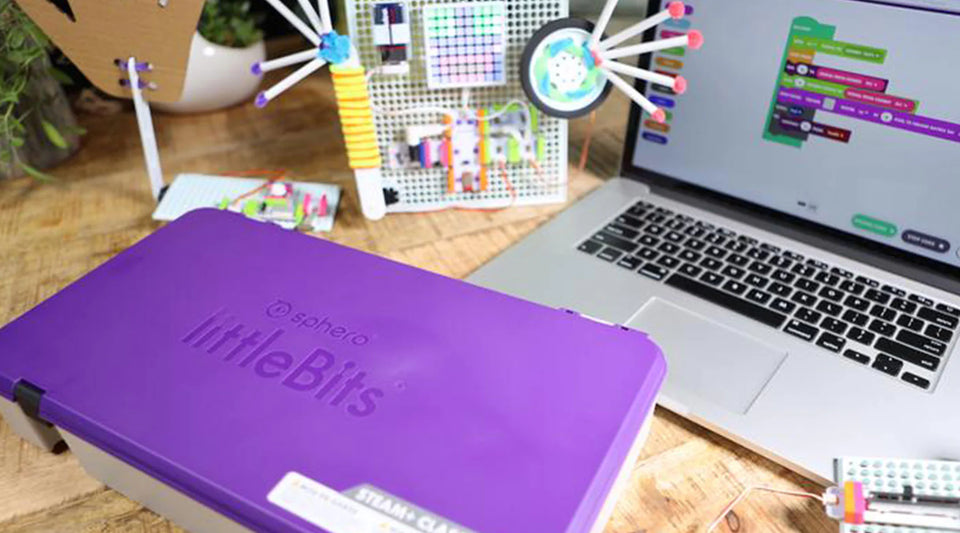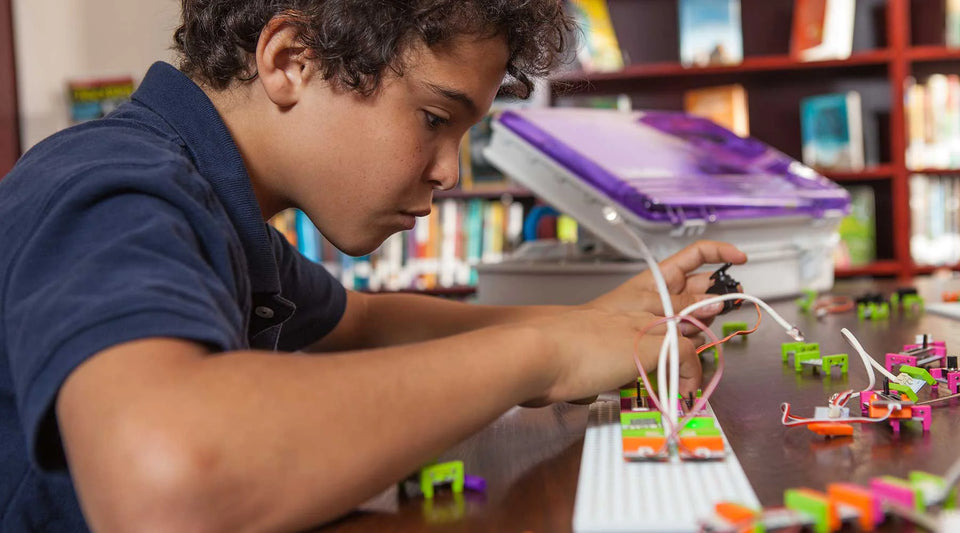

littleBits Fork
$22.68 ex GST
The fork Bit gives you more options for connecting your Bits: it lets you connect the output of a single Bit to as many as three others. The additional Bits will be right next to each other. Use it when you want to trigger light, sound, and motion at the same time.


littleBits Inverter
$17.23 ex GST
The littleBits inverter is a very contrary logic Bit. It sends out the opposite of whatever it receives: send it an ON signal, and the inverter changes it to an OFF signal, or vice versa. Try putting it between two lights after a button: clicking will make the LEDs blink back and forth, like the lights on top of a police car!
The lights on top of a police car flash back and forth. A pulse sends a signal to both of the lights, but they flash opposite one another due to the inverter.


littleBits Latch
$18.14 ex GST
Use the littleBits latch to turn any momentary input, like a button or a trigger module, into an ON/OFF switch, like a toggle! If you place a button in front of the latch, pressing the button once will turn it ON, and pressing it again will turn it OFF again. Or for even more fun, place a sound trigger in front of the latch, and a light after it...then, just snap your fingers!


littleBits micro:bit Adapter
$40.86 ex GST
Take learning & inventing further with the littleBits micro:bit Adapter
The littleBits micro:bit Adapter connects micro:bit and littleBits enabling new learning experiences and creative inventions in a less-intimidating way.
Enhance your learning with micro:bit by adding coding to your littleBits using platforms like the free Microsoft MakeCode or Python editor. It works by connecting the signals from the littleBits input and output bitsnaps to pins on the micro:bit edge connectors. No special coding libraries are needed.
* micro:bit is required for use & sold separately
Coding Capabilities
Microsoft MakeCode
Microsoft MakeCode is a free, open source platform for creating engaging computer science learning experiences that support a progression path into real-world programming.
Students new to coding can start with coloured blocks that they can drag and drop onto their workspace to construct their programs.
Python Editor for micro:bit
micro:bit Python editor is designed with teachers and learners in mind: you can easily enlarge the text size for sharing on a large screen or whiteboard, download projects as Python text files or .HEX files ready to flash onto a micro:bit. It also works with micro:bit classroom.
Featured Activities
micro:bit Countdown
Create your very own micro:bit countdown clock using your favourite littleBits and some help from MakeCode.
micro:bit Sunflower
Create a micro:bit powered sunflower to seek out the best and brightest spots in and around the room.
micro:bit Obstacles
Create your very own autonomous robot using a micro:bit, your favorite littleBits, and a Sphero RVR. See if you can program RVR through a maze or an obstacle course without it ever hitting a wall or object.


littleBits Split
$29.95 ex GST
The littleBits split module sends a single input to two wired outputs. It's great for connecting one output to two inputs, like using a keyboard to control two oscillators. But keep in mind that it can be used just like a wire module if you ignore one of its outputs.


littleBits Wire Bit
from $17.23 ex GST
The wire Bit is just what it sounds like - it allows you to physically separate your Bits. Try it whenever you need to break up your chain of Bits, like when you need to put a light at the top of a model building! You'll find many situations where you want a wire Bit.










